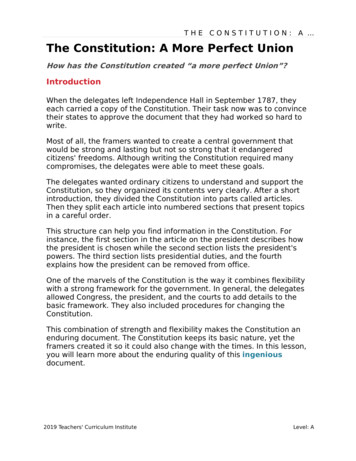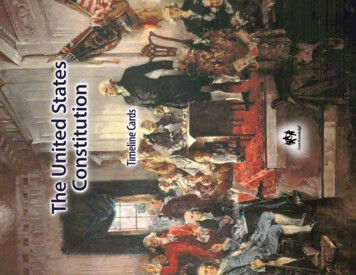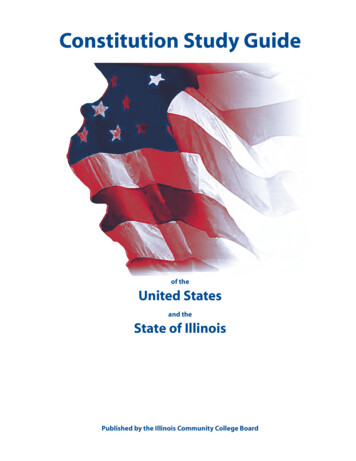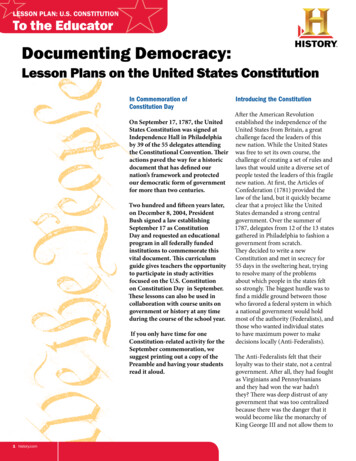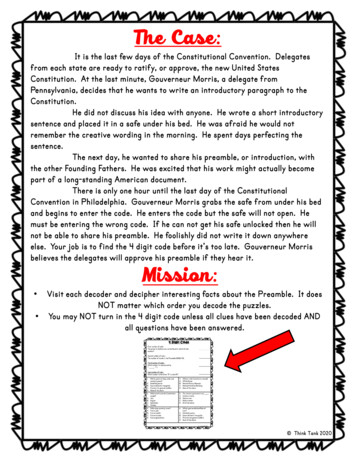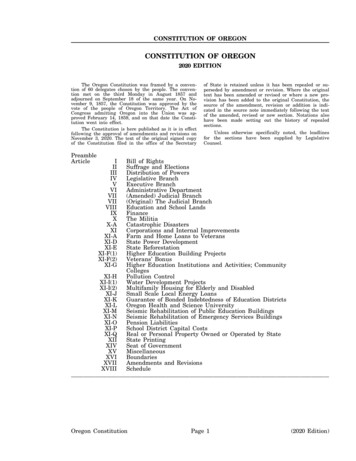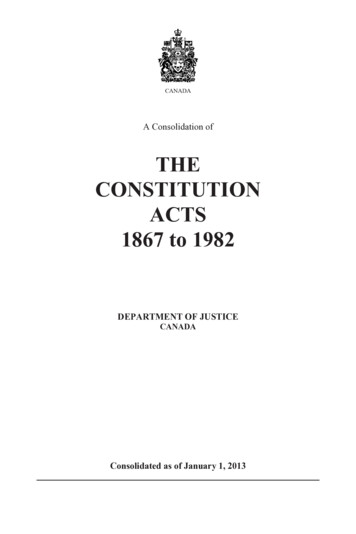
Transcription
THECONSTITUTIONof the United States NATIONAL CONSTITUTION CENTER
We the People of the United States, in Order to form amore perfect Union, establish Justice, insure domesticTranquility, provide for the common defence, promotethe general Welfare, and secure the Blessings of Liberty toourselves and our Posterity, do ordain and establish thisConstitution for the United States of America.Article. I.SECTION. 1.All legislative Powers herein granted shall be vested in aCongress of the United States, which shall consist of a Senate and House of Representatives.SECTION. 2.The House of Representatives shall be composed of Members chosen every second Year by the People of the severalStates, and the Electors in each State shall have the Qualifications requisite for Electors of the most numerous Branchof the State Legislature.No Person shall be a Representative who shall not haveattained to the Age of twenty five Years, and been sevenYears a Citizen of the United States, and who shall not,when elected, be an Inhabitant of that State in which heshall be chosen.[Representatives and direct Taxes shall be apportionedamong the several States which may be included withinthis Union, according to their respective Numbers, whichshall be determined by adding to the whole Number offree Persons, including those bound to Service for a Termof Years, and excluding Indians not taxed, three fifths ofall other Persons.]* The actual Enumeration shall be madeC O N S T I T U T I O N O F T H E U N I T E D S TAT E Swithin three Years after the first Meeting of the Congressof the United States, and within every subsequent Term often Years, in such Manner as they shall by Law direct. TheNumber of Representatives shall not exceed one for everythirty Thousand, but each State shall have at Least oneRepresentative; and until such enumeration shall be made,the State of New Hampshire shall be entitled to chusethree, Massachusetts eight, Rhode-Island and ProvidencePlantations one, Connecticut five, New-York six, NewJersey four, Pennsylvania eight, Delaware one, Marylandsix, Virginia ten, North Carolina five, South Carolina five,and Georgia three.When vacancies happen in the Representation from anyState, the Executive Authority thereof shall issue Writs ofElection to fill such Vacancies.The House of Representatives shall chuse theirSpeaker and other Officers; and shall have the solePower of Impeachment.SECTION. 3.The Senate of the United States shall be composed of twoSenators from each State, [chosen by the Legislature thereof,]* for six Years; and each Senator shall have one Vote.Immediately after they shall be assembled in Consequenceof the first Election, they shall be divided as equally as maybe into three Classes. The Seats of the Senators of the firstClass shall be vacated at the Expiration of the second Year,of the second Class at the Expiration of the fourth Year, andof the third Class at the Expiration of the sixth Year, so thatone third may be chosen every second Year; [and if Vacancies happen by Resignation, or otherwise, during the Recessof the Legislature of any State, the Executive thereof maymake temporary Appointments until the next Meeting ofthe Legislature, which shall then fill such Vacancies.]*1
No Person shall be a Senator who shall not have attainedto the Age of thirty Years, and been nine Years a Citizen ofthe United States, and who shall not, when elected, be anInhabitant of that State for which he shall be chosen.The Vice President of the United States shall bePresident of the Senate, but shall have no Vote, unlessthey be equally divided.The Senate shall chuse their other Officers, and also aPresident pro tempore, in the Absence of the VicePresident, or when he shall exercise the Office ofPresident of the United States.The Senate shall have the sole Power to try all Impeachments. When sitting for that Purpose, they shall be onOath or Affirmation. When the President of the UnitedStates is tried, the Chief Justice shall preside: And noPerson shall be convicted without the Concurrence of twothirds of the Members present.Judgment in Cases of Impeachment shall not extendfurther than to removal from Office, and disqualification tohold and enjoy any Office of honor, Trust or Profit underthe United States: but the Party convicted shall neverthelessbe liable and subject to Indictment, Trial, Judgment andPunishment, according to Law.SECTION. 4.The Times, Places and Manner of holding Elections forSenators and Representatives, shall be prescribed in eachState by the Legislature thereof; but the Congress may atany time by Law make or alter such Regulations, except asto the Places of chusing Senators.Each House shall keep a Journal of its Proceedings, andfrom time to time publish the same, excepting such Partsas may in their Judgment require Secrecy; and the Yeasand Nays of the Members of either House on any questionshall, at the Desire of one fifth of those Present, be enteredon the Journal.Neither House, during the Session of Congress, shall, without the Consent of the other, adjourn for more than threedays, nor to any other Place than that in which the twoHouses shall be sitting.SECTION. 6.The Senators and Representatives shall receive a Compensation for their Services, to be ascertained by Law, and paidout of the Treasury of the United States. They shall in allCases, except Treason, Felony and Breach of the Peace, beprivileged from Arrest during their Attendance at the Session of their respective Houses, and in going to and returning from the same; and for any Speech or Debate in eitherHouse, they shall not be questioned in any other Place.No Senator or Representative shall, during the Time forwhich he was elected, be appointed to any civil Officeunder the Authority of the United States, which shall havebeen created, or the Emoluments whereof shall have beenencreased during such time; and no Person holding anyOffice under the United States, shall be a Member of eitherHouse during his Continuance in Office.The Congress shall assemble at least once in every Year, andsuch Meeting shall be [on the first Monday in December,]*unless they shall by Law appoint a different Day.SECTION. 5.Each House shall be the Judge of the Elections, Returnsand Qualifications of its own Members, and a Majorityof each shall constitute a Quorum to do Business; but asmaller Number may adjourn from day to day, and may beauthorized to compel the Attendance of absent Members,in such Manner, and under such Penalties as each Housemay provide.Each House may determine the Rules of its Proceedings,punish its Members for disorderly Behaviour, and, with theConcurrence of two thirds, expel a Member.C O N S T I T U T I O N O F T H E U N I T E D S TAT E S2
SECTION. 7.SECTION. 8.All Bills for raising Revenue shall originate in the House ofRepresentatives; but the Senate may propose or concur withAmendments as on other Bills.The Congress shall have Power To lay and collect Taxes,Duties, Imposts and Excises, to pay the Debts and providefor the common Defence and general Welfare of the UnitedStates; but all Duties, Imposts and Excises shall be uniformthroughout the United States;Every Bill which shall have passed the House of Representatives and the Senate, shall, before it become a Law, bepresented to the President of the United States; If he approve he shall sign it, but if not he shall return it, with hisObjections to that House in which it shall have originated,who shall enter the Objections at large on their Journal,and proceed to reconsider it. If after such Reconsiderationtwo thirds of that House shall agree to pass the Bill, it shallbe sent, together with the Objections, to the other House,by which it shall likewise be reconsidered, and if approvedby two thirds of that House, it shall become a Law. But inall such Cases the Votes of both Houses shall be determinedby Yeas and Nays, and the Names of the Persons voting forand against the Bill shall be entered on the Journal of eachHouse respectively, If any Bill shall not be returned by thePresident within ten Days (Sundays excepted) after it shallhave been presented to him, the Same shall be a Law, inlike Manner as if he had signed it, unless the Congress bytheir Adjournament prevent its Return, in which Case itshall not be a Law.Every Order, Resolution, or Vote to which the Concurrence of the Senate and House of Representatives may benecessary (except on a question of Adjournment) shall bepresented to the President of the United States; and beforethe Same shall take Effect, shall be approved by him, or being disapproved by him, shall be repassed by two thirds ofthe Senate and House of Representatives, according to theRules and Limitations prescribed in the Case of a Bill.To borrow Money on the credit of the United States;To regulate Commerce with foreign Nations, and amongthe several States, and with the Indian Tribes;To establish an uniform Rule of Naturalization, and uniform Laws on the subject of Bankruptcies throughout theUnited States;To coin Money, regulate the Value thereof, and of foreignCoin, and fix the Standard of Weights and Measures;To provide for the Punishment of counterfeiting the Securities and current Coin of the United States;To establish Post Offices and post Roads;To promote the Progress of Science and useful Arts, bysecuring for limited Times to Authors and Inventors theexclusive Right to their respective Writings and Discoveries;To constitute Tribunals inferior to the supreme Court;To define and punish Piracies and Felonies committed onthe high Seas, and Offenses against the Law of Nations;To declare War, grant Letters of Marque and Reprisal, andmake Rules concerning Captures on Land and Water;To raise and support Armies, but no Appropriation ofMoney to that Use shall be for a longer Term than twoYears;To provide and maintain a Navy;To make Rules for the Government and Regulation of theland and naval Forces;To provide for calling forth the Militia to execute the Lawsof the Union, suppress Insurrections and repel Invasions;To provide for organizing, arming, and disciplining, theMilitia, and for governing such Part of them as may beemployed in the Service of the United States, reserving tothe States respectively, the Appointment of the Officers,and the Authority of training the Militia according to thediscipline prescribed by Congress;C O N S T I T U T I O N O F T H E U N I T E D S TAT E S3
To exercise exclusive Legislation in all Cases whatsoever,over such District (not exceeding ten Miles square) asmay, by Cession of particular States, and the Acceptanceof Congress, become the Seat of the Government of theUnited States, and to exercise like Authority over all Placespurchased by the Consent of the Legislature of the State inwhich the Same shall be, for the Erection of Forts, Magazines, Arsenals, dock-Yards and other needful Buildings;-AndSECTION. 10.No State shall enter into any Treaty, Alliance, or Confederation; grant Letters of Marque and Reprisal; coin Money;emit Bills of Credit; make any Thing but gold and silverCoin a Tender in Payment of Debts; pass any Bill of Attainder, ex post facto Law, or Law impairing the Obligationof Contracts, or grant any Title of Nobility.SECTION. 9.No State shall, without the Consent of the Congress, layany Imposts or Duties on Imports or Exports, except whatmay be absolutely necessary for executing it’s inspectionLaws: and the net Produce of all Duties and Imposts, laidby any State on Imports or Exports, shall be for the Use ofthe Treasury of the United States; and all such Laws shall besubject to the Revision and Controul of the Congress.The Migration or Importation of such Persons as any of theStates now existing shall think proper to admit, shall not beprohibited by the Congress prior to the Year one thousandeight hundred and eight, but a Tax or duty may be imposedon such Importation, not exceeding ten dollars for eachPerson.No State shall, without the Consent of Congress, lay anyDuty of Tonnage, keep Troops, or Ships of War in time ofPeace, enter into any Agreement or Compact with anotherState, or with a foreign Power, or engage in War, unlessactually invaded, or in such imminent Danger as will notadmit of delay.To make all Laws which shall be necessary and proper forcarrying into Execution the foregoing Powers, and all otherPowers vested by this Constitution in the Government ofthe United States, or in any Department or Officer thereof.The Privilege of the Writ of Habeas Corpus shall not besuspended, unless when in Cases of Rebellion or Invasionthe public Safety may require it.No Bill of Attainder or ex post facto Law shall be passed.[No Capitation, or other direct, Tax shall be laid, unless inProportion to the Census or Enumeration herein beforedirected to be taken.]*No Tax or Duty shall be laid on Articles exported from anyState.No Preference shall be given by any Regulation of Commerce or Revenue to the Ports of one State over those ofanother: nor shall Vessels bound to, or from, one State, beobliged to enter, clear, or pay Duties in another.No Money shall be drawn from the Treasury, but in Consequence of Appropriations made by Law; and a regularStatement and Account of the Receipts and Expenditures ofall public Money shall be published from time to time.No Title of Nobility shall be granted by the United States:And no Person holding any Office of Profit or Trust underthem, shall, without the Consent of the Congress, acceptof any present, Emolument, Office, or Title, of any kindwhatever, from any King, Prince, or foreign State.C O N S T I T U T I O N O F T H E U N I T E D S TAT E S4
Article. II.SECTION. 1.The executive Power shall be vested in a President of theUnited States of America. He shall hold his Office duringthe Term of four Years, and, together with the Vice President, chosen for the same Term, be elected, as follows:Each State shall appoint, in such Manner as the Legislaturethereof may direct, a Number of Electors, equal to thewhole Number of Senators and Representatives to whichthe State may be entitled in the Congress: but no Senator orRepresentative, or Person holding an Office of Trust or Profit under the United States, shall be appointed an Elector.[The Electors shall meet in their respective States, and voteby Ballot for two Persons, of whom one at least shall notbe an Inhabitant of the same State with themselves. Andthey shall make a List of all the Persons voted for, and ofthe Number of Votes for each; which List they shall signand certify, and transmit sealed to the Seat of the Government of the United States, directed to the President of theSenate. The President of the Senate shall, in the Presenceof the Senate and House of Representatives, open all theCertificates, and the Votes shall then be counted. ThePerson having the greatest Number of Votes shall be thePresident, if such Number be a Majority of the wholeNumber of Electors appointed; and if there be more thanone who have such Majority, and have an equal Number ofVotes, then the House of Representatives shall immediatelychuse by Ballot one of them for President; and if no Personhave a Majority, then from the five highest on the Listthe said House shall in like Manner chuse the President.But in chusing the President, the Votes shall be taken byStates, the Representation from each State having one Vote;A quorum for this Purpose shall consist of a Member orMembers from two thirds of the States, and a Majority ofall the States shall be necessary to a Choice. In every Case,after the Choice of the President, the Person having thegreatest Number of Votes of the Electors shall be the VicePresident. But if there should remain two or more whohave equal Votes, the Senate shall chuse from them by Ballot the Vice President.]*C O N S T I T U T I O N O F T H E U N I T E D S TAT E SThe Congress may determine the Time of chusing theElectors, and the Day on which they shall give their Votes;which Day shall be the same throughout the United States.No Person except a natural born Citizen, or a Citizenof the United States, at the time of the Adoption of thisConstitution, shall be eligible to the Office of President;neither shall any person be eligible to that Office who shallnot have attained to the Age of thirty five Years, and beenfourteen Years a Resident within the United States.[In Case of the Removal of the President from Office, or ofhis Death, Resignation, or Inability to discharge the Powersand Duties of the said Office, the Same shall devolve on theVice President, and the Congress may by Law provide forthe Case of Removal, Death, Resignation or Inability, bothof the President and Vice President, declaring what Officershall then act as President, and such Officer shall act accordingly, until the Disability be removed, or a Presidentshall be elected.]*The President shall, at stated Times, receive for his Services,a Compensation, which shall neither be increased nordiminished during the Period for which he shall have beenelected, and he shall not receive within that Period anyother Emolument from the United States, or any of them.Before he enter on the Execution of his Office, he shalltake the following Oath or Affirmation:- “I do solemnlyswear (or affirm) that I will faithfully execute the Office ofPresident of the United States, and will to the best of myAbility, preserve, protect and defend the Constitution ofthe United States.”5
SECTION. 2.SECTION. 3.The President shall be Commander in Chief of the Armyand Navy of the United States, and of the Militia of theseveral States, when called into the actual Service of theUnited States; he may require the Opinion, in writing, ofthe principal Officer in each of the executive Departments,upon any Subject relating to the Duties of their respectiveOffices, and he shall have Power to grant Reprieves andPardons for Offenses against the United States, except inCases of Impeachment.He shall from time to time give to the Congress Information of the State of the Union, and recommend to theirConsideration such Measures as he shall judge necessary and expedient; he may, on extraordinary Occasions,convene both Houses, or either of them, and in Case ofDisagreement between them, with Respect to the Time ofAdjournment, he may adjourn them to such Time as heshall think proper; he shall receive Ambassadors and otherpublic Ministers; he shall take Care that the Laws be faithfully executed, and shall Commission all the Officers of theUnited States.He shall have Power, by and with the Advice and Consentof the Senate, to make Treaties, provided two thirds of theSenators present concur; and he shall nominate, and by andwith the Advice and Consent of the Senate, shall appointAmbassadors, other public Ministers and Consuls, Judgesof the supreme Court, and all other Officers of the UnitedStates, whose Appointments are not herein otherwiseprovided for, and which shall be established by Law: butthe Congress may by Law vest the Appointment of such inferior Officers, as they think proper, in the President alone,in the Courts of Law, or in the Heads of Departments.SECTION. 4.The President, Vice President and all civil Officers of theUnited States, shall be removed from Office on Impeachment for, and Conviction of, Treason, Bribery, or otherhigh Crimes and Misdemeanors.The President shall have Power to fill up all Vacanciesthat may happen during the Recess of the Senate, bygranting Commissions which shall expire at the End oftheir next Session.C O N S T I T U T I O N O F T H E U N I T E D S TAT E S6
Article. III.SECTION. 1.SECTION. 3.The judicial Power of the United States, shall be vestedin one supreme Court, and in such inferior Courts as theCongress may from time to time ordain and establish. TheJudges, both of the supreme and inferior Courts, shall holdtheir Offices during good Behaviour, and shall at statedTimes, receive for their Services, a Compensation, whichshall not be diminished during their Continuance in Office.Treason against the United States, shall consist only in levying War against them, or in adhering to their Enemies, giving them Aid and Comfort. No Person shall be convictedof Treason unless on the Testimony of two Witnesses to thesame overt Act, or on Confession in open Court.SECTION. 2.The judicial Power shall extend to all Cases, in Law andEquity, arising under this Constitution, the Laws of theUnited States, and Treaties made, or which shall be made,under their Authority; - to all Cases affecting Ambassadors, other public Ministers and Consuls; - to all Cases ofadmiralty and maritime Jurisdiction; - to Controversies towhich the United States shall be a Party; - to Controversiesbetween two or more States; - [between a State and Citizensof another State;-]* between Citizens of different States,- between Citizens of the same State claiming Lands underGrants of different States, [and between a State, or the Citizens thereof;- and foreign States, Citizens or Subjects.]*The Congress shall have Power to declare the Punishmentof Treason, but no Attainder of Treason shall work Corruption of Blood, or Forfeiture except during the Life of thePerson attainted.In all Cases affecting Ambassadors, other public Ministersand Consuls, and those in which a State shall be Party, thesupreme Court shall have original Jurisdiction. In all theother Cases before mentioned, the supreme Court shallhave appellate Jurisdiction, both as to Law and Fact, withsuch Exceptions, and under such Regulations as the Congress shall make.The Trial of all Crimes, except in Cases of Impeachment;shall be by Jury; and such Trial shall be held in the Statewhere the said Crimes shall have been committed; but whennot committed within any State, the Trial shall be at suchPlace or Places as the Congress may by Law have directed.C O N S T I T U T I O N O F T H E U N I T E D S TAT E S7
Article. IV.Article. V.SECTION. 1.The Congress, whenever two thirds of both Houses shalldeem it necessary, shall propose Amendments to this Constitution, or, on the Application of the Legislatures of twothirds of the several States, shall call a Convention for proposing Amendments, which in either Case, shall be valid toall Intents and Purposes, as Part of this Constitution, whenratified by the Legislatures of three-fourths of the severalStates, or by Conventions in three fourths thereof, as theone or the other Mode of Ratification may be proposed bythe Congress; Provided that no Amendment which may bemade prior to the Year One thousand eight hundred andeight shall in any Manner affect the first and fourth Clausesin the Ninth Section of the first Article; and that no State,without its Consent, shall be deprived of its equal Suffragein the Senate.Full Faith and Credit shall be given in each State to thepublic Acts, Records, and judicial Proceedings of every other State. And the Congress may by general Laws prescribethe Manner in which such Acts, Records and Proceedingsshall be proved, and the Effect thereof.SECTION. 2.The Citizens of each State shall be entitled to all Privilegesand Immunities of Citizens in the several States.A Person charged in any State with Treason, Felony, orother Crime, who shall flee from Justice, and be found inanother State, shall on Demand of the executive Authority of the State from which he fled, be delivered up, to beremoved to the State having Jurisdiction of the Crime.[No Person held to Service or Labour in one State, underthe Laws thereof, escaping into another, shall, in Consequence of any Law or Regulation therein, be dischargedfrom such Service or Labour, but shall be delivered up onClaim of the Party to whom such Service or Labour may bedue.]*SECTION. 3.New States may be admitted by the Congress into thisUnion; but no new State shall be formed or erected withinthe Jurisdiction of any other State; nor any State be formedby the Junction of two or more States, or Parts of States,without the Consent of the Legislatures of the States concerned as well as of the Congress.The Congress shall have Power to dispose of and make allneedful Rules and Regulations respecting the Territory orother Property belonging to the United States; and nothingin this Constitution shall be so construed as to Prejudiceany Claims of the United States, or of any particular State.SECTION. 4.The United States shall guarantee to every State in thisUnion a Republican Form of Government, and shallprotect each of them against Invasion; and on Applicationof the Legislature, or of the Executive (when the Legislaturecannot be convened) against domestic Violence.C O N S T I T U T I O N O F T H E U N I T E D S TAT E S8
Article. VI.Article. VII.All Debts contracted and Engagements entered into, beforethe Adoption of this Constitution, shall be as valid againstthe United States under this Constitution, as under theConfederation.The Ratification of the Conventions of nine States, shallbe sufficient for the Establishment of this Constitutionbetween the States so ratifying the Same.This Constitution, and the Laws of the United Stateswhich shall be made in Pursuance thereof; and all Treatiesmade, or which shall be made, under the Authority of theUnited States, shall be the supreme Law of the Land; andthe Judges in every State shall be bound thereby, any Thingin the Constitution or Laws of any State to the Contrarynotwithstanding.The Senators and Representatives before mentioned, andthe Members of the several State Legislatures, and all executive and judicial Officers, both of the United States and ofthe several States, shall be bound by Oath or Affirmation,to support this Constitution; but no religious Test shall everbe required as a Qualification to any Office or public Trustunder the United States.Done in Convention by the Unanimous Consent of theStates present the Seventeenth Day of September in theYear of our Lord one thousand seven hundred and Eightyseven and of the Independence of the United States ofAmerica the Twelfth In Witness whereof We have hereuntosubscribed our Names,Go. Washington--Presidt:and deputy from VirginiaNEW HAMPSHIREJohn LangdonNicholas GilmanMASSACHUSETTSNathaniel GorhamRufus KingCONNECTICUTWm. Saml. JohnsonRoger ShermanNEW YORKAlexander HamiltonNEW JERSEYWil: LivingstonDavid BrearleyWm. PatersonJona: DaytonPENNSYLVANIAB FranklinThomas MifflinRobt MorrisGeo. ClymerThos. FitzSimonsJared IngersollJames WilsonGouv MorrisC O N S T I T U T I O N O F T H E U N I T E D S TAT E S9
DELAWAREGeo: ReadGunning Bedford junJohn DickinsonRichard BassettJaco: BroomMARYLANDJames McHenryDan of St. Thos. JeniferDanl CarrollVIRGINIAJohn BlairJames Madison Jr.NORTH CAROLINAWm. BlountRichd. Dobbs SpaightHu WilliamsonSOUTH CAROLINAJ. RutledgeCharles Cotesworth PinckneyCharles PinckneyPierce ButlerGEORGIAWilliam FewAbr BaldwinAttest William Jackson SecretaryIn Convention MondaySeptember 17th, 1787.PresentThe States ofNew Hampshire, Massachusetts, Connecticut, Mr. Hamilton from New York, New Jersey, Pennsylvania, Delaware,Maryland, Virginia, North Carolina, South Carolina andGeorgia.Resolved,That the preceeding Constitution be laid before the UnitedStates in Congress assembled, and that it is the Opinionof this Convention, that it should afterwards be submittedto a Convention of Delegates, chosen in each State by thePeople thereof, under the Recommendation of its Legislature, for their Assent and Ratification; and that each Convention assenting to, and ratifying the Same, should giveNotice thereof to the United States in Congress assembled.Resolved, That it is the Opinion of this Convention, thatas soon as the Conventions of nine States shall have ratifiedthis Constitution, the United States in Congress assembledshould fix a Day on which Electors should be appointed bythe States which shall have ratified the same, and a Day onwhich the Electors should assemble to vote for the President, and the Time and Place for commencing Proceedingsunder this Constitution.That after such Publication the Electors should be appointed, and the Senators and Representatives elected: Thatthe Electors should meet on the Day fixed for the Electionof the President, and should transmit their Votes certified,signed, sealed and directed, as the Constitution requires, tothe Secretary of the United States in Congress assembled,that the Senators and Representatives should convene at theTime and Place assigned; that the Senators should appointa President of the Senate, for the sole Purpose of receiving,opening and counting the Votes for President; and, thatafter he shall be chosen, the Congress, together with thePresident, should, without Delay, proceed to execute thisConstitution.By the unanimous Order of the ConventionGo. Washington-Presidt:W. JACKSON Secretary.* Language in brackets has been changed by amendment.C O N S T I T U T I O N O F T H E U N I T E D S TAT E S10
THE AMENDMENTS TO THE CONSTITUTION OFTHE UNITED STATES AS RATIFIED BY THE STATESPreamble to the Bill of RightsCongress of the United Statesbegun and held at the City of New-York, onWednesday the fourth of March,one thousand seven hundred and eighty nineTHE Conventions of a number of the States, having atthe time of their adopting the Constitution, expresseda desire, in order to prevent misconstruction or abuseof its powers, that further declaratory and restrictiveclauses should be added: And as extending the groundof public confidence in the Government, will bestensure the beneficent ends of its institution.RESOLVED by the Senate and House ofRepresentatives of the United States of America,in Congress assembled, two thirds of both Housesconcurring, that the following Articles be proposed tothe Legislatures of the several States, as amendmentsto the Constitution of the United States, all, or any ofwhich Articles, when ratified by three fourths of the saidLegislatures, to be valid to all intents and purposes, aspart of the said Constitution; viz.ARTICLES in addition to, and Amendment of theConstitution of the United States of America, proposedby Congress, and ra
To declare War, grant Letters of Marque and Reprisal, and make Rules concerning Captures on Land and Water; To raise and support Armies, but no Appropriation of Money to that Use shall be for a longer Term than two Years; To provide and maintain a Navy; To make Rules for th


